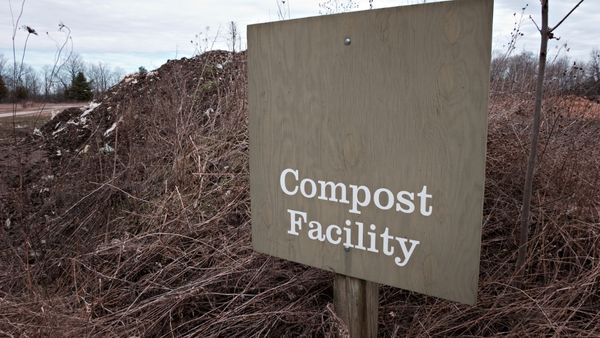
There are several “death” days on the Weird Holidays & Observances page, such as Plan Your Epitaph Day, which is observed on both April 6 and November 2, and Cremation Day, which is observed on December 9. Not that human composting is cremation, but it is a similar, yet more eco-friendly, alternative.
But what is human composting, and how do you do it? Is it even legal? Let’s explore this way of going green even in the afterlife.
About Human Composting
Even if you’re not a gardener, you’re probably at least familiar with the idea of composting. I liked the way Luxury Landscape succinctly summed it up, “The point of compost is to nourish your soil to provide a healthy habitat in which your grass, plants, and trees can thrive.”
That’s pretty much the purpose of human composting too. As Recompose, a green funeral home in Seattle, explains on their site, they use “a process called natural organic reduction to transform human remains into soil.”
They use 8 feet long 4 feet tall steel cylinders for their composting. Bodies decompose atop a bed of wood chips, alfalfa, and straw in the “vessels.”
A CNN article about it said that once the process is complete, relatives and loved ones receive some of the soil while the rest is donated to conservation land.
Wait, what? Loved ones don’t get to keep all of the soil? We’ll explore more about that in the cons of the process below.
The Benefits of Human Composting
Cremation is often less expensive than a burial, and I always assumed it was more environmentally friendly too. Apparently not. As CNN reported, “Cremations require lots of fuel —cremating one corpse emits an estimated 418 pounds of carbon dioxide into the air, the equivalent of driving 470 miles in a car.”
They also listed a stat from Green Burial Council Inc. that “cremations account for 1.74 billion pounds of carbon dioxide emissions each year.” And that’s just in the U.S. alone.
But human composting can reduce those emissions while putting bodies to good use.
The Cons of Human Composting
While it can reduce greenhouse gas emissions, there are some cons too. For one, it’s not a quick process, as you might imagine. It can take up to 120 days to compost a body. That makes space a problem. And if demand for the service grew, well…basic economics, right? The more people who want it without enough vessels to go around leads to a supply and demand issue that could raise prices.
Another problem is that not every person is a candidate. As CNN reported, “Natural organic reduction destroys most harmful pathogens, but there are three rare diseases that disqualify a body from undergoing human composting.” They are ebola, tuberculosis, and “diseases caused by prions, which are abnormal, transmissible pathogenic agents that can cause abnormal folding of certain brain proteins.”
An even bigger problem is that human composting isn’t legal in most states. Washington was the first to legalize it in 2019. Oregon, Vermont, and Colorado were next. California recently passed a bill approving it, which goes into effect in 2027. New York recently passed a bill, too, and lawmakers in Massachusetts are working on getting one passed there as well.
And remember how I mentioned only some of the soil is returned to families? Well, the amount depends on state laws. As CNN pointed out, “the soil would still be legally considered human remains with regulations on what people can do with them.”
But mostly, right now, human composting isn’t practical on a large scale, which may inhibit its widespread use.
A Tour of Recompose
Caitlin Doughty from Ask a Mortician took a tour of Recompose, which she shared on her YouTube channel. I’ve embedded it here if you’re curious to check it out.
Check-In
Would you consider human composting as an alternative to burial or cremation?
Courtney Mroch is a globe-trotting restless spirit who’s both possessed by wanderlust and the spirit of adventure, and obsessed with true crime, horror, the paranormal, and weird days. Perhaps it has something to do with her genes? She is related to occult royalty, after all. Marie Laveau, the famous Voodoo practitioner of New Orleans, is one of her ancestors. (Yes, really! As explained here.) That could also explain her infatuation with skeletons.
Speaking of mystical, to learn how Courtney channeled her battle with cancer to conjure up this site, check out HJ’s Origin Story.

I’d definitely consider it! I’ve wanted that tree burial or something…definitely no chemicals, etc pumped in after I die!
Sure, I’d consider it. It’s natural. But I understand why some people would be squeamish about it.
I would for sure get composted. Coffins are so wasteful.
I think I remember seeing that too. Tree pods or something? I think you can also transform yourself into corral for the oceans. But now you got me thinking about a new post I can write related to all of this! THANKS!!!
“Squeamish” is a perfect word! It’s uncomfortable to think about death at all, but much less what will happen to your remains. And when it challenges the status quo…well, I was thinking people might balk but I wish I’d used the word squeamish!
Yes…and they freak me out. I mean, the thought of being put in one. Nope. I’d rather be burned up. Amazingly that bothers me less. But now knowing how much emissions it kicks out…dilemmas! I’d probably be okay with no box and just being pitched into the ground. I never understood why we don’t do that anyway. So this makes loads of sense to me on multiple levels. lol
Ha, that’s great! Spreading inspiration instead of the usual “Chaos” is always good! Looking forward to your next post(s)! I remember (it may have been on an episode of Cosmos, or maybe a recent StarTalk listen?), Neil DeGrasse Tyson saying that he wanted a natural burial too…something about having eaten up resources and when he died, he wanted to “give back”…return the favor, so to speak.
THANKS for that nugget about DeGrasse. I can use that in my research about all of this! And I love him even more now because that’s his perspective. Such a great one. Why can’t we have more of folks like him in the world? What would it be like if we celebrated them more and didn’t give attention to the ones always wanting to tear things down?
Wow, that is interesting! My husband works on a household waste composting facility, I wonder if he’s heard about the human composting process overseas? I will show him your article. It makes sense to me but I can understand the issues of storage and running costs. I would rather have my body put to good use when I’m gone rather than wasting away.
I’ll be curious to hear if he has heard anything about it. Maybe you have something similar over there too! And I 100% agree with you. This way makes SO much more sense to me. Totally appeals to my practical Virgo sensibilities. lol